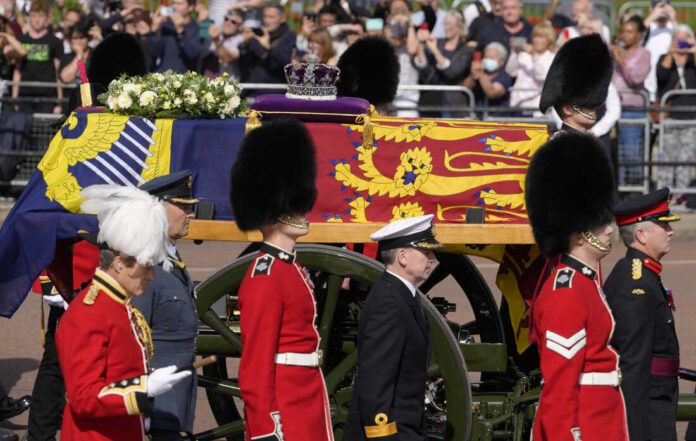

It’s a question that may be on the minds on many parents or carers right now. For school aged children, the Queen has been a popular topic amongst schools this year, with the Platinum Jubilee being celebrated just a few months ago, and now the country mourns the death of Her Majesty.
As a parent or carer you may be wondering if watching the funeral with your children is appropriate or necessary – or your child may have even mentioned it to you before you’d considered it. It’s important to remember there is no right or wrong answer to that question, you know and understand your child.
Death may be familiar to some children while for others it may be a new experience. For those who’ve not experienced bereavement before, they’ll be hearing lots of concepts that are likely new to them and may need some explaining. For children who’ve already experienced the death of somebody important, this may be a reminder of what death means to them and their loved ones. They may or may not have attended a funeral before, but could be asking you about watching The Queen’s funeral. It could be a good opportunity to introduce the concept of funerals to a child.
National childhood bereavement charity Winston’s Wish have shared some ways you could help a child’s understanding if you were to watch the funeral together.
Prepare them in advance of the funeral
As adults, we feel more secure and well-prepared when we know what to expect. Children are no different. Discuss what they will see when the funeral is shown on TV. This could be things like: what the inside of a religious building may looks like making comparisons to your own, the ceremony, the silence, procession, or the coffin. Perhaps it would be worth pointing out that this funeral may be on a very different or much bigger scale than those you may have experienced in your own communities, and you could discuss how they differ. Bringing up certain topics in little doses may feel easier than all at once.
Explain what death means
As adults we also find death a difficult concept. This can mean we find talking to children about it hard too as we want to shield and protect them. It’s important to try and help children understand the physical side of death, comparisons between ‘alive’ and ‘dead’ could be helpful or explanation such as – the body has stopped working and they no longer need it. This may be an opportunity to introduce any spiritual or religious beliefs your family holds too.
Talk about emotions
People’s emotions are affected in different ways at funerals, and we don’t always know or can predict how we’ll react ourselves. We may be directly affected, remembering our own grief, or saddened on behalf of others being sad. With children it’s no different; they may get sad and that’s okay – it’s a natural response to be sad when someone dies. Other people grieving may experience other emotions; anything from anger right through to numbness. Some may not look sad but sit quietly. Others may be seen smiling as someone shares a fond memory.
Make it clear that it’s okay to feel the way they do when watching the funeral. If they want to cry, that’s okay. If they want to sit quietly, that’s also okay. Perhaps it’s still too much to understand or handle and taking a break from watching is also ok.
Be mindful of their needs
Whether before, during or after the funeral, pay attention to the child’s reactions and ask how they are feeling. Even though you will have prepared the child for what they are watching, it will be reassuring for them to know they have the option to stop if it becomes overwhelming.
Answer any questions that they might have
Be curious and ask them how they found it or if it has stirred up any thoughts or questions for them. Be prepared to answer their questions as simply and honestly as you can. Asking questions can help them process what is happening, but don’t feel like you should have all the answers. It’s okay to say, “I don’t know” or “Let’s find out” but it’s important to not close down the question. This gives you the opportunity to both learn and find the answers together.
Check on the child after the funeral has happened
After the Queen’s funeral, whether a few days or weeks have passed, it’s good to check in again, and ask the child if they’ve any more questions or thoughts about their experience. Ask how they are feeling and if they need to talk through anything they saw or didn’t understand. Encourage them to share how they are feeling, sharing how the experience was for you may also help them open up.
Ask if they want to remember the Queen in a special way
Some children may like to remember The Queen or another person close to them by doing something special. Just as it helps us as adults to find special ways to remember people that have died, it also helps children.
Where to get further support
Winston’s Wish provides support for grieving children, young people (up to 25) and for adults supporting them. Their Freephone Helpline is available on 08088 020 021 from 8am-8pm, Monday to Friday or email ask@winstonswish.org
If you need urgent support, the Winston’s Wish Crisis Messenger is available 24/7 for free, confidential support in a crisis. Text WW to 85258.
Help keep news FREE for our readers
Supporting your local community newspaper/online news outlet is crucial now more than ever. If you believe in independent journalism, then consider making a valuable contribution by making a one-time or monthly donation. We operate in rural areas where providing unbiased news can be challenging. Read More About Supporting The West Wales Chronicle






















